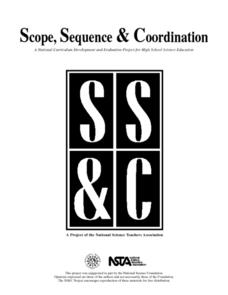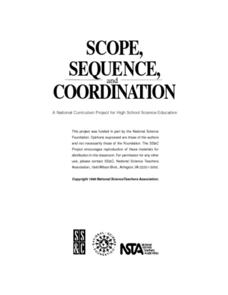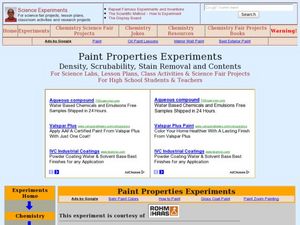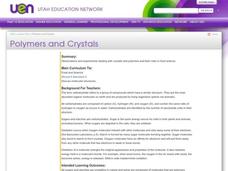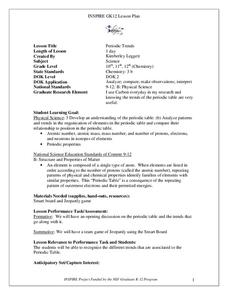Curated OER
Properties of Useful Carbon Compounds
Nine action-packed organic chemistry exercises are contained in this mini-unit on carbon containing compounds. Examples include constructing models of alkanes, producing aromatic esters, and preparing pigments for paint and dyes....
Kenan Fellows
Using Water Chemistry as an Indicator of Stream Health
Will this water source support life? Small groups test the chemistry of the water drawn from two different sources. They then compare the collected data to acceptable levels to draw conclusions about the health of the source. The...
Curated OER
Carbon Bonds in Chemistry
Venture into the world of macromolecules with three exciting, distinct laboratory activities. Young chemists examine the forms of carbon and discover how they are associated with atomic arrangement, construct models of carbon-containing...
Baylor College
What Is a Neuron?
Your class won't get on your nerves while doing this modeling activity! After teaching the structure and function of a neuron using the included diagrams, give individuals some clay and chenille stems so that they can make their own...
Curated OER
The Biofuel Project: Creating Biodiesel
Students research about the processing of biodiesel fuels. In this energy lesson, students produce their own biodiesel using used and new vegetable oil. They discuss the environmental and economic benefits of using biodiesel.
Curated OER
Carbon Dioxide
Students conduct a series of experiments to explore carbon dioxide properties. For this chemistry lesson, students explain the production and uses of this gas. They measure its amount in soda and waste product of yeast.
Curated OER
Chemiluminescence
Students explore chemiluminescence through various experiments. In this chemistry lesson plan, students explain the chemical reaction that drives the process. They give real life applications of chemiluminescence.
Curated OER
The East Fork Project
Students identify possible sources of health risks, types of exposures, routes of exposure, and populations that could be affected after discussing water pollution and environmental health hazards. After discussion, students conduct a...
Curated OER
Constructing a Periodic Table of Elements
Students create a periodic table of elements. For this chemistry lesson, students work together to build all of the different elements into a complete mini periodic table. They identify similarity and difference of the elements.
Curated OER
Chromatographic Separation of Methylene Blue and Sodium Fluorescein
Students determine the best solvent system for separating a methylene blue/sodium fluorescein mixture by thin layer chromatography. They conduct an initial TLC separation using ethanol and a different solvent mixture and analyze the data...
Curated OER
Quantitative Determination of the Composition of Water-based Paints and the Correlation of Paint Properties to Pain Composition
Students perform a series of tests on water-based paints. In this chemistry lesson, students identify their different functions. They calculate paint density and fractional concentrations.
Olomana School
Mixtures and Solutions: Paper Chromatography Experiment
Why does some ink bleed through paper, and other ink doesn't? Practice some paper chromatography to separate the colors from a pen with an interactive experiment for middle and high schoolers. Learners use a variety of solutions to track...
Consortium for Ocean Science Exploration and Engagement (COSEE)
Carbon Dioxide & Krill: Impacts
What effects do temperature and carbon dioxide levels have on the zooplankton of Antarctica? This concluding lesson plan in a short unit on climate change and the ocean helps environmental scientists answer these questions. After...
Consortium for Ocean Science Exploration and Engagement (COSEE)
Ocean Acidification: Whats and Hows
Open this instructional activity by demonstrating the production of acidic carbon dioxide gas by activated yeast. Emerging ecologists then experiment with seashells to discover the effect of ocean acidification on shelled marine...
Curated OER
Water and Polymers
Students conduct qualitative and quantitative investigations based on the interaction between water and various polymers. They determine the percent moisture contained in various plastics along with a qualitative procedure to determine...
Curated OER
Polymers and Crystals: Their Role in Food Science
Blend chemistry with cooking in this exploration of polymers, carbohydrates, and food science. Experimenting with gelatin produces concrete examples of the bonding and ploymerization discussed in the lesson. Copious, comprehensive...
Curated OER
Sunrise/Sunset
Third graders discovver what causes the dramatic colors of a sunset by seeing the changing color of light as it passes through a clear container of water to which milk is gradually added. They measure the liquids and observe what happens...
Virginia Department of Education
Elements and Electron Configuration
It's electronic! Pupils uncover elements and their electron configurations as they explore mass, groupings, correct charges, and sliding theory. Young scientists learn creative ways to remember various elements and correctly...
Curated OER
Chemosynthesis in the Classroom
Pupils observe the development of chemosynthesis in bacterial communities. In this bacteria lesson students explore that chemosynthesis is and how it is relevant to biological communities.
Curated OER
Alkanes and Conformation
In this alkanes and conformation worksheet, students name 10 different alkanes, they write the structural formulas for 4 alkanes, and they write Newman projections for 2-methylbutane. They also write structure of stable conformations for...
Curated OER
Math, Chemistry, and Food
Students explore the effects of chemical reactions when cooking. Using the Internet, they research enzymes and then mix jello. They examine their results and test enzyme activity by adding pineapple to the jello. Finally, they test...
Curated OER
Periodic Trends
Learners identify the different periodic trends. In this chemistry instructional activity, students discuss how elements are arranged in the periodic table. They apply what they have learned in a Jeopardy team game.
Curated OER
Periodic Table Patterns using Fabulous Periodic
Students explain how elements are arranged in the periodic table. In this chemistry lesson plan, students group the eggs according to a certain pattern. They compare this to elements in the periodic table.
Curated OER
Calculating the Average Mass of the Newly Discovered Element: Bean
Students determine the average mass of a new element using masses from three isotopes. In this chemistry lesson, students explain what an isotope is. They discuss their importance and uses.


